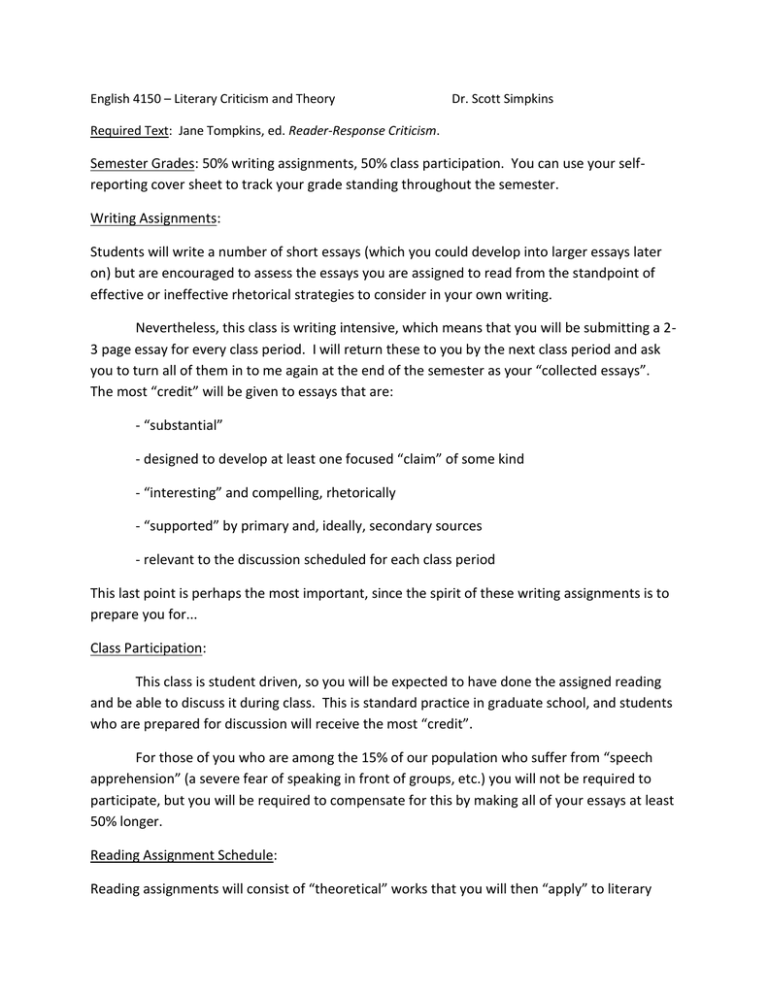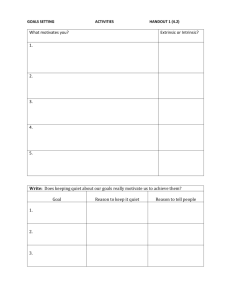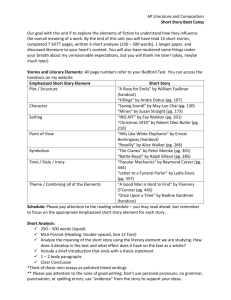English 4150 – Literary Criticism and Theory Dr. Scott Simpkins
advertisement

English 4150 – Literary Criticism and Theory Dr. Scott Simpkins Required Text: Jane Tompkins, ed. Reader-Response Criticism. Semester Grades: 50% writing assignments, 50% class participation. You can use your selfreporting cover sheet to track your grade standing throughout the semester. Writing Assignments: Students will write a number of short essays (which you could develop into larger essays later on) but are encouraged to assess the essays you are assigned to read from the standpoint of effective or ineffective rhetorical strategies to consider in your own writing. Nevertheless, this class is writing intensive, which means that you will be submitting a 23 page essay for every class period. I will return these to you by the next class period and ask you to turn all of them in to me again at the end of the semester as your “collected essays”. The most “credit” will be given to essays that are: - “substantial” - designed to develop at least one focused “claim” of some kind - “interesting” and compelling, rhetorically - “supported” by primary and, ideally, secondary sources - relevant to the discussion scheduled for each class period This last point is perhaps the most important, since the spirit of these writing assignments is to prepare you for... Class Participation: This class is student driven, so you will be expected to have done the assigned reading and be able to discuss it during class. This is standard practice in graduate school, and students who are prepared for discussion will receive the most “credit”. For those of you who are among the 15% of our population who suffer from “speech apprehension” (a severe fear of speaking in front of groups, etc.) you will not be required to participate, but you will be required to compensate for this by making all of your essays at least 50% longer. Reading Assignment Schedule: Reading assignments will consist of “theoretical” works that you will then “apply” to literary texts in a workshop-like fashion. Week 1 - Essentialism and Relativism - Norman Fruman, “Reconstructing English” (pdf file handout on my departmental website hereafter: “handout”) - Fruman/Simpkins email exchange (handout) Week 2 - E. D. Hirsch, “Introduction: Meaning and Significance,” The Aims of Interpretation (handout) Catherine Gallagher, Introduction to Nobody’s Story (handout) Week 3 - Charles Baxter, “The Next Building I Plan to Bomb” (handout) - Baxter/Simpkins email exchange (handout) Week 4 - Theory, Determinacy, and the “Profession” - Jonathan Culler, “Literary Competence” (textbook) Week 5 - Jacques Derrida, “‘I have forgotten my umbrella’” (handout) - Simpkins, “Limited Infinite Play” (handout) Week 6 - Joyce Carol Oates, “Where Are You Going, Where Have You Been?” (handout) - 2 handouts pertaining to “The Book of Judges” from the Christian Bible Week 7 - Susan Glaspell, Trifles and “A Jury of Her Peers” (handouts) Week 8 - Form and Structure - Gerald Prince, “Introduction to the Study of the Narratee” (textbook) Week 9 - Michael Riffaterre, “Describing Poetic Structures” (textbook) - Jakobson and Lévi-Strauss, “On Baudelaire’s Les chats” Week 10- Tanya Reinhart, "Patterns, Intuitions, and the Sense of Nonsense” (handout) Week 11 - Susan Lanser, “Toward A Feminist Narratology” (handout) Week 12 - The Death of the Author/The Birth of the Reader - Roland Barthes, “The Death of the Author” and “From Work to Text” (handouts) - Michel Foucault, “What is an Author?” (handout) - Walker Gibson, “Authors, Speakers, Readers, and Mock Readers” (textbook) Week 13 – (Thanksgiving week); - dancing scene from Ernest Hemingway, The Sun Also Rises and “The Short, Happy Life of Francis Macomber” (handouts) Week 14 - Georges Poulet, “Criticism and the Experience of Interiority” (textbook) - Wolfgang Iser, “The Reading Process” (textbook) - Stanley Fish, “Literature in the Reader” (textbook) Week 15 - Theory Now - Norman Holland, “Unity Identity Text Self” (textbook) - David Bleich, “Epistemological Assumptions in the Study of Response” (textbook) - Kate Chopin, “The Story of an Hour” (handout) - your collected essays are due on the last day of class along with your self-reporting cover sheet



